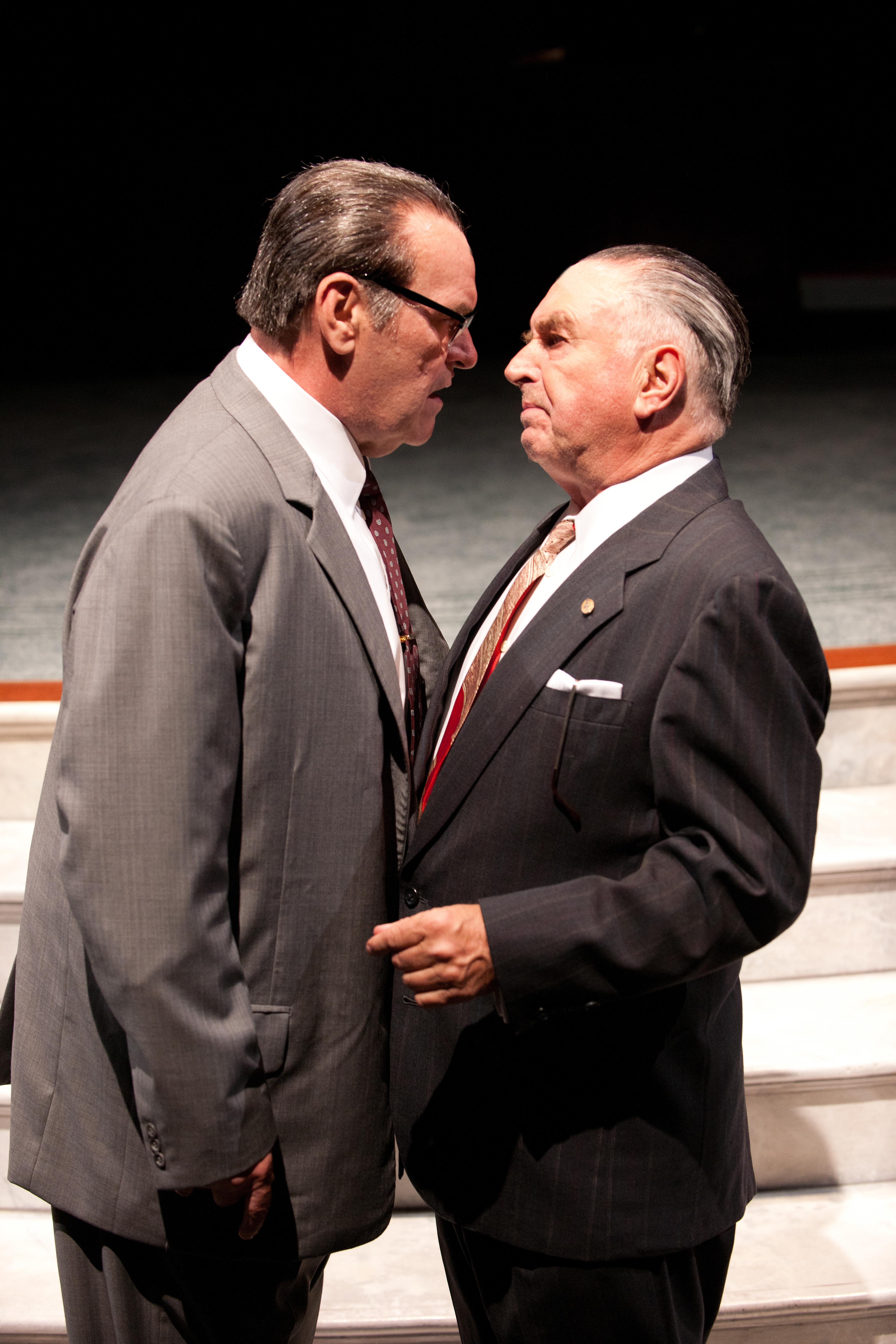One is hard-pressed to imagine a more productive presidency than Lyndon B. Johnson’s, yet how rarely does one imagine it today. Launched into office on November 22, 1963, with the brain stains still wet on Jackie Kennedy’s pink Chanel suit, LBJ would make landmark gains in civil rights, antipoverty programs, Medicare, immigration, and environmental protection. Yet because Johnson embroiled the nation in the Vietnam War, those accomplishments have often been eclipsed from posterity. Until now.
Seattle playwright Robert Schenkkan’s broad, bustling Tony winner reframes our view of the fairness-championing Lone Star magician/politician. Historians will tell you that Johnson plied all angles and snatched unlikely votes out of cantankerous retrograde cronies. But how did he do it, what did it mean to work the aisle, and why isn’t that kind of thing happening now? These are questions a demoralized 2014 electorate hankers to chew on, and All the Way provides a compelling refresher course covering the scant year from LBJ’s assumption of office through his 1964 victory over Barry Goldwater. It’s a long, historically dense play that on December 10 will begin alternating with Schenkkan’s The Great Society—about Johnson’s tumultuous full term in office. Still, it’ll save you the nearly 2,000 pages of Robert Caro’s multivolume biography. (Or it just might inspire you to read it).
With a cast of 17 playing up to six roles each, it’s a wonder these performers can master not only their lines but their identities and complex blocking during so many short scenes. Many of the fast-paced scenes overlap on Christopher Acebo’s single set, ringed by the seating of a legislative chamber. (News photos and videos, including the Zapruder film of JFK’s assassination, are projected to the rear.) Other scenes and soliloquies are separated by David Weiner’s spotlighting. Both of Schenkkan’s LBJ plays debuted at the Oregon Shakespeare Festival (co-sponsored by Seattle Rep) under the same briskly effective direction of OSF’s Bill Rauch. (He also helmed the Bryan Cranston-starring Broadway show last year.) Here we again have Rauch’s original LBJ, the excellent Jack Willis.
Willis arranges his leonine jowls and creases to approximate LBJ’s physical imposingness, obstinacy, and vulnerability. He’s a lovable lout, spouting vulgarisms (“ ‘Nice’ is what you call a girl with no tits, no ass, and no personality”) and anxious that enemies and unpopularity will block his grand vision of the Civil Rights Act of 1964. As we see, he lies, cheats, and bullies to realize this vision. Meanwhile, African-Americans led by Martin Luther King Jr. (an enigmatic Kenajuan Bentley) reluctantly support Johnson in exchange for the future promise of voting-rights legislation (to be continued in the next play with the same cast), while white Southern Dixiecrats follow proudly racist George Wallace (stiff-wigged Jonathan Haugen).
One of Schenkkan’s main motifs is the future reddening of the South and the Southerning of the Republican party, as Johnson predicted. The audience laughs knowingly when LBJ scolds Hubert Humphrey (Peter Frechette), “This ain’t about principles, it’s about votes. That’s the problem with you liberals—you don’t know how to fight.” Fifty years later, particularly after President Obama’s midterm losses, liberal Seattle theatergoers are eager to see a gloves-off fighter in action. Yet despite our nostalgia for a such a strong political leader, the reality is that Obama, were he as brash and aggressive as LBJ, would be excoriated as an angry black man. (Damned if you do . . . )
Schenkkan packs scads of information and backstory into chorus-like powwows among various factions. (All the Way is a big, busy play, like his The Kentucky Cycle.) Unless you remember the ’60s and these political battles, close listening is required to keep track of who’s who. Some characters’ names and alliances are usefully projected for us to follow, along with vote tallies and the countdown to the 1964 election. It’s dizzying, but it conveys the scramble that Johnson had to navigate for civil rights—all the while consolidating power for his passion project, the War on Poverty. (Again, to be continued in the next play.)
At its most exciting moments, All the Way invites you into the psyche of this political animal, often in the form of LBJ’s soliloquies. (House of Cards does the same, and we recognize both how much and how little has changed in Washington, D.C.) “ ‘Politics is war by other means,’ ” says LBJ, quoting von Clausewitz. “Bullshit. Politics is war. Period.” And more, he calls politics “a knife fight in a dark room with a slippery floor.” I could eat that stuff all day, and the opening-night audience was just as receptive.
In contrast to the exhilarating political steeplechase toward civil rights, the looming tragedy of Vietnam enters All the Way late, like poison gas, with the Gulf of Tonkin incident. U.S. Naval ships were possibly attacked? His advisers aren’t sure, but to LBJ it’s one of those lines that must not be crossed—like Saddam’s supposed WMDs or Assad’s chemical-weapon attacks. This proud Texan is lured from one fight to another. Even if we all know the outcome of Schenkkan’s twinned plays, both triumph and tragedy, I am counting the days to The Great Society.
stage@seattleweekly.com
SEATTLE REPERTORY THEATRE 155 Mercer St. (Seattle Center), 443-2222. $17–$150. Tues.–Sun. & weekend matinees. See seattlerep.org for schedule. Ends Jan. 4.








